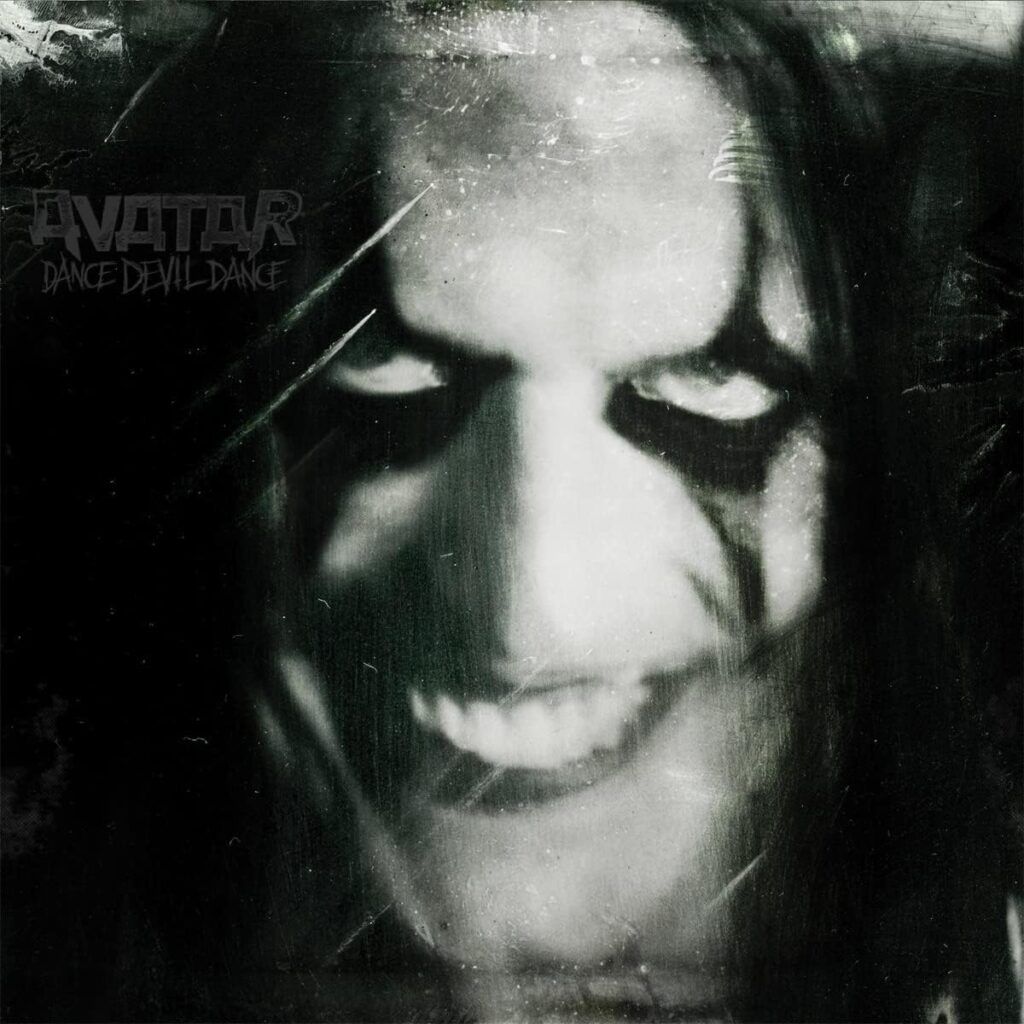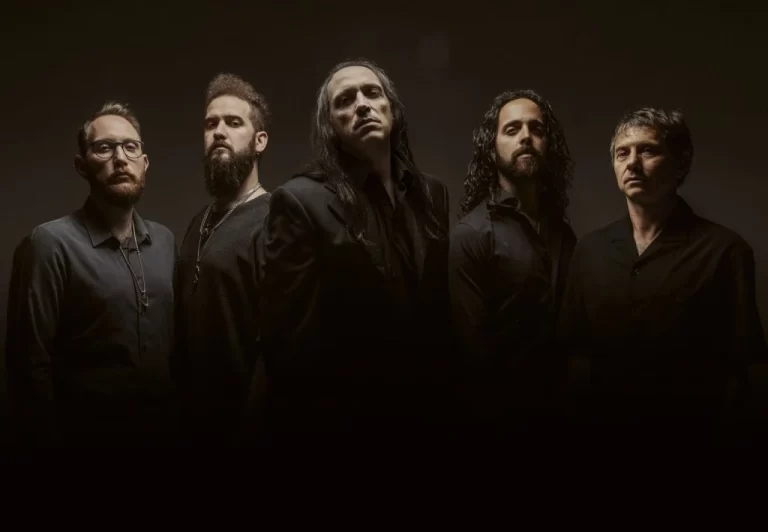Emerging from the backstage area at Download Festival 2023, and fresh from performing in front one of their largest ever crowds on UK soil, Avatar’s Johannes Eckerstrom is an imposing figure. Towering over us and still in his stage gear, he is a calm and thoughtful interview, amiably answering our questions despite the fact that there’s a conveyor line of journalists just waiting for his attention. Covering a lot of ground in a short space of time, it was a pleasure to return once more to Avatar Country, with Johannes as our guide…

The first question is about the performative aspect of the band. With artists like Joe Bonamassa, when the suit goes on, or in Kiss’ case it’s the makeup, there’s a shift in personality almost. Is that something you find?
No, I don’t have a stage name for that reason – I could never find one because it’s all Johannes through and through, and I think that goes for the rest of the guys. It’s theatrical, what we do, but it’s not theatre. And that is why it works so well for us. It feels like something that can keep going and we can do forever – we didn’t invent or discover this look, it’s more a feeling – this is what the music looks like. It’s more a liberation, than a transformation, I would say.
That’s an interesting thing because a lot of people look at bands who are, perhaps, more performative, but they don’t necessarily take into account the music, and there are a lot of bands who have been written off that way.
Yeah
So, it’s quite a challenge to get it right – is that something you’ve found as you’ve developed and evolved the sound of the band.
Well, I can’t speak for the outside perspective of it, because if people get it, they get it and if they don’t, they don’t and that’s fine. But we really start with the music first and finish with the music and, in the middle, there’s that conversation – how to express the music in every possible avenue we can go down. So, at this point, it comes pretty naturally. It’s almost like a marketing question, in a way, what you asked and yeah, you always try to figure that part out. But, again, I feel… I relate a bit to whatever I feel I know and have read about drag artists; you know. That kind of letting people find themselves more in a way of dressing that isn’t necessarily the norm in society and just defining themselves through something like that. It’s kind of that. So, to think up how that comes across and whether it’s too over the top, or not over the top enough, we’re just us in that sense.
It’s interesting. For me, a lot of the bands I like have that very creative angle and when you’re trying to find videos, for example, that represent you and represents the music, you don’t necessarily have to follow the same angle as the lyrics – so you can have something that’s out there and quite fun, but the lyrics can be quite dark.
Exactly, that happens to us a lot because it is… even the title of the album, Dance Devil Dance – it refers to the fact that heavy metal is rock ‘n’ roll, it’s dance. It’s metal, so at the same time, so our dance is different – it hurts. So, there’s that celebratory thing, and then the devil and all those things, so it’s an exploration of the darker corners of your mind and whatever that means. So, yeah, when it’s a video or a look, you try to find what’s in there to visualise. And sometimes it is the lyrics. Hail to the Apocalypse was totally the lyrics, the Blood Angel music video very much so – and probably more, but that’s very much off the top of my head. Sometimes, though, it’s about finding the musical expression and then you can be really playful, like the last one: Chimp Moshpit, it’s totally that, you know. And I guess the Dance Devil Dance song – maybe 50/50. But yeah, absolutely, you can play around with it, and we also try not to repeat ourselves to the best of our ability.
I see it like the old blues mentality – the whole thing was to have catharsis through the lyrics, which in some cases were incredibly dark and personal, but at the same time blues artists want to make people move and have a good time – it’s so they’re experiences, no matter how dark and negative, can bring other people joy through the music. Is that the same perspective for you?
Absolutely, and I think that’s very much what metal is all about in so many ways, right? The mosh pit going on behind us right now is exactly that – catharsis, and empowerment.
At the same time, one of the things that is possibly the most challenging, is to write lyrics that are personal and cathartic, and yet are, at the same time, universal and relatable. Is that something you find as you work through writing an album?
No [laughs] Really, no. What I’ve come to learn, as a fan and as a writer is that the universal thing just happens when it’s right. The narrower you are, the more specific you feel in what you’re saying, the more universal it feels. Like, I don’t know, Springsteen name-dropping names of streets in New Jersey somehow makes someone in Bangkok feel more at home and more relatable to their street in Bangkok, than if he just said “streets,” you know.
That’s a really interesting point. In terms of making the music itself, I know you guys prefer to record live together in the room, but during the pandemic, did you find you had to switch modes and start recording separately?
No, we didn’t need to do that because the actual album was recorded after the fact and Hunter Gatherer, just before. So, writing, because I live in Finland and the rest of the guys in Sweden, there was always a good chunk of it that would happen remotely, then we come together, take a long weekend in a cabin somewhere and go all manic with each other a couple of times. So, it was just normal – we always have to and want to play together one way or another.
Dance Devil Dance was recorded live in the sense that the drum and bass takes we kept, but the guitars were playing as well, and I did a few vocal takes, although I also chill out and sort of co-produce, or make lunch! But then you have the energy of the band playing music together, but if you want to redo the guitars to make them more specific or have sounds on individual tracks, you can. But still, that foundation, the most important is always there – which is the way the bass and drums speak to each other – how they lock in.
So, like Henrik’s said he’d never record bass without John playing drums, I’m pretty sure he said that somewhere, and I agree. It’s just different. And also, if you do all the drum takes in just a few days and all the bass takes in a few days, you don’t have the time to rediscover the songs and be creative as a writer in the studio. That’s also a moment where the songs can come alive again. You have to sit in your room, in a dark corner, and write it. Then you have to show it to the guys, then you rehearse it. And the studio is also a writing session if you allow it to be.
I always think the studio is a hotbed of creativity, particularly if you’ve got the drummer and bassist clicking – you might get a different groove to what you expected.
Exactly, and if I sing along on the initial takes, we might switch things around, you know. Little rewrites can happen, even at that stage.
So, my final question, because I think you’re about to be dragged off to the next one – very briefly, this is return to Download for you, I think last time you played, you had the throne come out of the stage…
Did we have that here?!
Yes, you did, it was amazing! So, what do festivals like this mean for bands like Avatar, do you think?
I mean, I’m pretty sure this was the biggest crowd we’ve been in front of in the United Kingdom, which is what it means. I mean, frankly, the sets are a bit short at Download, so we had to figure out how to treat that, and we had to fly in from the continent with everything we’re doing there, so we were like “OK, we love the Ramones, 1,2,3,4!” – just bang it out. So, it was really intense, so it was a really fun trip. But, over the years, we’ve played here a few times now, so we’ve started to feel at home.
Amazing, thank you so much.



